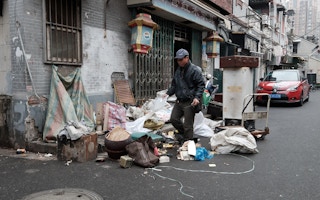As is the case in many developing countries, China’s informal waste collection economy is a highly efficient sector when it comes to sorting and recycling waste in cities.
But a recent Shanghai-focused report finds that the future of the informal economy is uncertain as the municipal government looks to tighten waste regulations and beef up infrastructure to deal with growing amounts of trash and fast-filling landfill sites.
“Sustainability Insights: Shanghai’s Informal Waste Management”, a report released by China-based sustainability consultancy Collective Responsibility, argues that a well-functioning and sustainable waste management system must incorporate the informal sector to combine efficiencies from both.
The report, launched last week, provides an overview of Shanghai’s informal waste management economy, profiling the migrant workers that power it and the trends that will shape it in the years to come.
The Chinese metropolis of 24 million generated 7.89 million tonnes of municipal waste last year. According to the Collective Responsibility report, 3 million tonnes was directed to landfill and 2.5 million tonnes was incinerated.
Collective Responsibility’s managing director Richard Brubaker told Eco-Business that the company chose to spotlight the role of informal waste collectors for two reasons. “First, we look at how cities are going to work [with an urban population] of 7 billion people by 2050, and core to that is how we will manage our waste,” he said.
“The second is that we have known for some time that the informal waste market is both efficient and vibrant, and we simply want to understand it better.”
China has a growing waste problem and World Bank data shows that the world’s biggest economy could be producing almost 1.4 million tonnes of trash daily in eight years’ time. Buoyed by rising incomes and consumption as the country’s commercial capital, Shanghai’s waste output has steadily grown since 2005, according to figures in the Collective Responsibility report.
Citizens have so far not responded to calls to separate trash, while formal trash collectors do not have the capacity to collect sorted waste.
In contrast, the report found that informal trash picking systems were able to have used materials—cardboard, plastic and metals in particular—returned to the manufacturing cycle as soon as 10 to 15 days after disposal.
“[The waste collectors] specialise in recycling and reuse – selling waste to recycling plants, factories, and reprocessing centres, diverting from landfill in the process,” said the report.
The fact that the formal sector does not sort, recycle or reuse material is one reason that the informal sector is booming, states the report.
The second is that the private network of rubbish collectors and sorters remove recyclable waste from the trash generated by businesses and construction sites, lightening its weight and therefore cutting the cost of formal waste collection.
By some estimates, the informal sector accounts for between 0.56 to 0.93 per cent of the Chinese urban population but recycle some 17 to 38 per cent of municipal waste.
But the report highlighted that Shanghai is seeking to formalise its waste sector, following illegal dumping scandals, pushback from residents who reject informal collection centres as dirty, and a greater awareness of the need for transparency, accountability and better waste management processes in its value chains. For instance, the national government has announced that a national electronic waste plan will be implemented by end 2017.
The city has its work cut out. There is a need to build more infrastructure to manage Shanghai’s growing volume of waste efficiently, while figuring out how to “incorporate informal collectors into the formalised system, maintain their incentives, and keep up with their everyday collection efficiency”.
Speaking to Eco-Business about the report, Brubaker said that while incorporating the informal sector into the formal one is necessary, his team does not have a clear model for doing so at the city level.
“We have been talking with some developers, who have large amounts of waste, about creating a formal team of recyclers by hiring the informal teams that are already servicing their site, but those discussions are still at an early stages,” Brubaker shared.
He also told Eco-Business: “As much as emotionally we would like to say that these individuals [in the informal economy] are best placed, the scale of need is outside the capacity of those currently in the system.”
“However, there are opportunities to identify current actors who have large investments [such as informal collection centres] already, and formalise them.”
This is one of the three areas for investments the report outlined. The other two are investing in environmentally friendly, waste-to-energy projects in Shanghai, as well as developing recycling, waste-to-energy projects and formal waste collectors in China’s second, third, and fourth-tier cities.

















